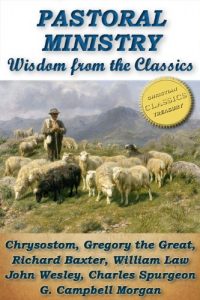G. Campbell Morgan on Pastoral Ministry
Have you ever wanted to sit at the feet of G. Campbell Morgan, Charles Spurgeon, or John Wesley? What was it about their ministries that had a such long-lasting impact? This anthology brings together some of the greatest works on PASTORAL MINISTRY ever penned and it is our prayer that they will encourage, challenge and strengthen you in your ministry for the Lord.
This anthology includes the full text of the following 7 classics:
• TREATISE ON THE PRIESTHOOD – Chrysostom
• THE BOOK OF PASTORAL RULE – St. Gregory the Great
• THE REFORMED PASTOR – Richard Baxter
• ADDRESS TO THE CLERGY – William Law
• CONVERSATIONS WITH PREACHERS – John Wesley
• LECTURES TO MY STUDENTS – Charles Spurgeon
• THE MINISTRY OF THE WORD – G. Campbell Morgan
Get it today on Amazon here.
G Campbell Morgan: The Ministry of the Word
Written in 1919 after more than 30 years of ministry, this book is a Biblical look at pastoral ministry. In his introduction, Morgan reflects on the empowering of the early church on the day of Pentecost, and their subsequent “ministry of the word”:
As the movement grew, hostility became more daring. The Apostles were next imprisoned, but they were supernaturally liberated, and fear fell afresh upon their enemies. Still resisting the power of the Spirit, the rulers beat the Apostles, and then were confronted by the astonishing spectacle of men who rejoiced “that they were counted worthy to suffer dishonor for the Name.” Such were these wonderful days. Within the fellowship, “the Twelve” were exercising a ministry of teaching and guidance on behalf of the whole multitude of those who, believing, were being added to the Lord.
The paragraph in which the phrase occurs opens with the words, “In these days”; and reveals their special characteristics in the statement, “the number of the disciples was multiplying.” It then records the incident of the difficulty which arose in the distribution of the common funds. This difficulty resulted from the persistence of an old trouble within the Christian atmosphere, that of the mutual suspicion and unfriendliness of the Hellenists and the Hebrews. The former complained, in all probability not without reason, that the Hebrews within the community neglected the Hellenist widows. The dispute itself has no interest for us now, but the way in which it was dealt with leads us to our theme, and throws considerable initial light thereupon.
When the murmuring occurred, the Apostles ,”called the multitude of the disciples” together. In other words, the difficulty was dealt with by the whole Church in solemn assembly, under the guidance of the Apostles. There was no panic, no dissension. The matter was speedily and smoothly adjusted. In the midst of His people was the Lord Himself, according to His covenant; and He, by the Holy Spirit, mode known His will. The action thus taken was a very remarkable one in many ways, but they are not immediately relevant to our theme. One matter, however, is of importance.
This was made the occasion for a necessary and vital division of responsibility in the interest of the life and service of the Church. From henceforth there were to be within her borders two orders in the one ministry; the one having to do with the serving of tables, and the other with the service of the Word. It is in this connection that our phrase occurs. Having charged the Church to elect “men of good report full of the Spirit and of wisdom,” for the business of Serving tables, the Apostles said; “We will continue steadfastly in prayer, and in the ministry of the Word.”
That phrase is one of abiding importance in its revelation of the true nature and method of one aspect of Christian Ministry; that aspect which demands the devotion of the whole time and energy of those called upon to exercise it, and which cannot be perfectly exercised by those whose time and energy are taken up with other matters, however right and proper such matters may be in themselves. Within the phrase itself are contained words which suggest the fundamental conceptions. To these we shall give careful attention before proceeding to deal with the primitive ideal, or attempting to make any modern application. In proportion as we accurately apprehend the significance of the terms “the Ministry” and “the Word,” we shall be prepared for a consideration of the whole subject of “the Ministry of the Word,” and the privilege and responsibility of those called thereto.
Get this important book by Campbell Morgan on Pastoral Ministry – along with the other classics by Spurgeon, Wesley and others – on Amazon here.
Check out some of the other great “7 Classics” series on Prayer, Power and the Holy Spirit at www.ClassicChristianEbooks.com

